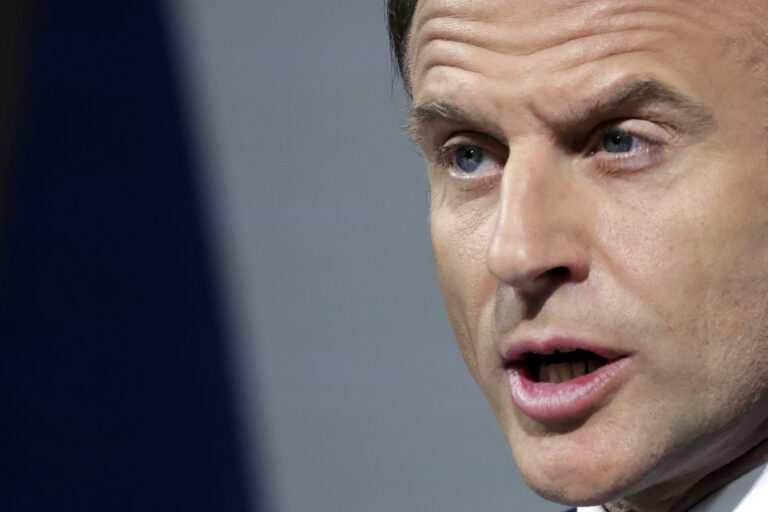
French President Emmanuel Macron said he won’t resign if his party suffers a poor result in a snap parliamentary election as he appealed to voters not to succumb to the “fever of the extremists.”
French bonds tumbled on Tuesday following a report that the president had discussed resigning if he suffers a second big defeat in succession with investors on edge about a potential takeover by Marine Le Pen’s far-right National Rally.
“I will kill this false report,” the French leader said at a press conference presenting a hastily assembled campaign program. “It’s absurd.”
The 46-year-old president caught investors by surprise on Sunday night when he dissolved the National Assembly in response to a crushing defeat by Le Pen in elections for the European Parliament.
The vote confronts France’s European partners with the risk of Le Pen’s party taking control of the legislature for the first time. That would threaten Macron’s response to the war in Ukraine and his effort to rein in the budget deficit, while reverberating across Europe’s relations with China and the U.S. in the face of the potential return of Donald Trump to the White House.
Polls show Marine Le Pen’s National Rally party has a substantial lead going into the first round of voting on June 30. However, the two-round system in France means rival parties can unite to block the far-right’s path in the second vote July 7.
French government bonds inched to a session high after the announcement, with the 10-year yield slipping to 3.20%. The rate has jumped more than 10 basis points this week as Macron’s call for a snap vote rattled investor confidence. It touched a high of 3.33% on Tuesday, the highest since November.
France’s CAC 40 Index rose 0.6% at 1:43 p.m., adding on to gains from before Macron started speaking.
Macron said he will appoint a prime minister as the constitution requires after the election, but urged supporters not to resign themselves to the idea that it will necessarily be someone from Le Pen’s party.
“The day after these elections I will have to draw conclusions, as the constitution demands, and choose a prime minister,” he said. “But that’s not giving away the keys to power. It’s allowing the political groups that will have been chosen by the French to govern.”
Under France’s constitutional framework the choice of the premier is down to the president, but it is accepted practice that the head of state picks someone from the new parliamentary majority, and that’s what happened in 1997, 1993 and 1986, when the legislature and the presidency were controlled by different parties.
The president held out the possibility of a far-right prime minister as an extra incentive for French people to engage in the political process. “If people are scared of that, now is the time to wake up,” he said.
Macron made a broad pitch to what he called social democrats and the republican right to ally with his centrist group to produce a majority. He said efforts to form alliances on the far right and far left were riddled with contradictions over policies such as pension reform and supporting Ukraine.
He set out five key policy areas, ranging from boosting the economy to investing in public services and military independence. As he looked to appeal to right-wing voters, he began by focusing on boosting security and responding firmly to crime, cutting illegal immigration, and making sure religious laws don’t trump those of the state.
The president had previously focused his economic policy on measures he said would boost growth and bolster public finances, such as raising the pension age and trimming the generosity of unemployment welfare. But Le Pen has latched onto concerns about the cost of living to bolster her popularity over the last two years.
“Our citizens have sent us a clear message that their lives haven’t improved enough,” he said. “The forces of the majority must therefore build concrete responses on this subject and the prime minister has begun working on it, on the cost of energy, spending power and work that must pay better.”
While Macron’s comments may have stabilized markets in the short term, questions over his political future are likely to return if Le Pen does emerge from the elections next month with a stronger hand.
Charles de Gaulle, France’s dominant post-war leader, set the precedent in this respect after losing a referendum in 1969. While the plebiscite was nominally about creating new regions and changing the operation of the Senate, the underlying question for most French people, according to the newspaper Le Monde, was whether they still had faith in him.
“If I am disavowed by a majority of you,” de Gaulle said in a televised address. “My current role as head of state will obviously become impossible, and I will immediately cease to exercise my functions.” After a narrow majority voted against the changes, de Gaulle followed through on his commitment and announced his resignation.
When Macron announced that he was calling snap elections on Sunday, he posed a similar test of faith as the one failed by De Gaulle more than half a century earlier, though it didn’t include an ultimatum.
“This is a serious, weighty decision, but it is above all an act of confidence,” Macron said on Sunday. “Confidence in you, my dear compatriots, in the ability of the French people to make the right choice for themselves and for future generations.”
___
© 2024 Bloomberg L.P
Distributed by Tribune Content Agency, LLC.
0 comments :
Post a Comment